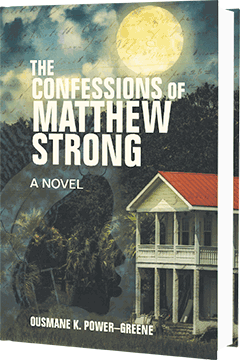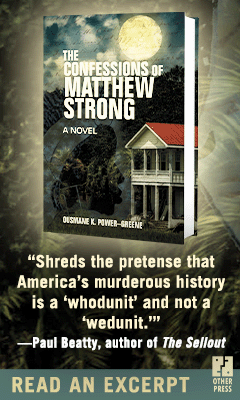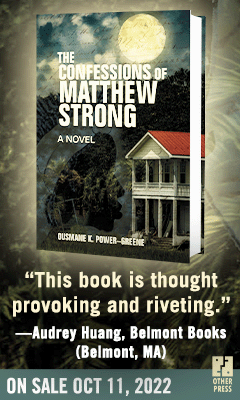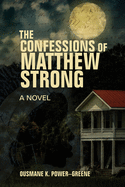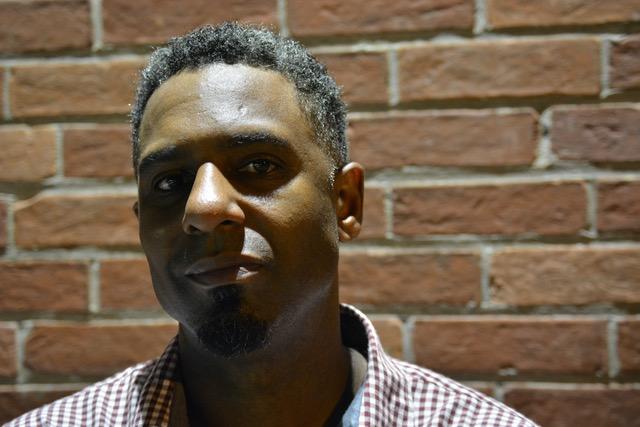The Confessions of Matthew Strong
by Ousmane Power-Greene
With The Confessions of Matthew Strong, academic and noted historian Ousmane K. Power-Greene's first foray into fiction, readers will teeter on the edge of the horrified even as they recognize the issues of white supremacy and political violence from contemporary news reports. Power-Greene marries plot and pacing with decades of historical research, creating a tale of identity and family, power and tradition, kidnapping and survival, and triumph over evil. He manages the difficult balancing act of tapping into the real fears and psychological unease present in readers without tipping over into horror.
Allegra Douglass has worked hard for her accolades, earning the coveted Distinguished Chair in Philosophy at her university in New York through her work on the ideology and rhetoric of slaveholders, after leaving her activist days behind. Allie also believes she's left behind her childhood in Birmingham, Ala.--until she learns of her beloved grandmother's death. The news comes on the very night of the awards ceremony conferring the Chair position on her, the first African American to receive such an honor. When she returns to Alabama to help her sister with arrangements for the funeral, Allie finds herself wrapped up in the mystery surrounding a series of disappearances of young Black women around the state. Beyond her natural sense of concern, Allie can't ignore the resonance of what others might see as disparate events: a former student of Allie's who had gone missing some weeks before; the unsolved disappearance of Allie's mother decades before; and a series of polite but unsettling letters Allie has been receiving, all of them signed "William Shields."
As Allie works to untangle the mystery, she is drawn further into a nefarious plot, before ultimately being kidnapped herself. This is not a spoiler, as readers know the events of the story from the beginning. Power-Greene has built this novel in reverse chronological order, with numbered sections, each subdivided into chapters with titles such as "Fourteen Days Before My Abduction." Despite knowing that Allie survives to tell her own story, readers will be compelled to keep turning the pages, wanting to know how she manages to escape and what she will discover along the way.
As for the issues of racial injustice, power and the growing number of white supremacist movements and organizations, Power-Greene's academic work informs that of Allie Douglass's. The author's background as a historian shines through when Allie is discussing her research into "pro-slavery rhetoric designed to recast slaveholders as enlightened and progressive rather than violent and reactionary." Like any good researcher, Allie makes heavy use of libraries, special collections and the work of other scholars and historians. But it was Allie's grandmother who began this deep dive, devoting "hours to going through map collections and archival records of former plantations in the South... It appeared that she theorized the disappearances correlated with a recent project to restore old plantation homes." The historical documents also reveal the true identity of William Shields, the son of a slaveholding plantation owner who once orchestrated an uprising against the government. Once Allie sees that Shields is a pseudonym, she can build on the foundation of research her grandmother started and begin to piece together the truth behind the disappearances and the hateful motivations of Matthew Strong, the charismatic leader of the Sons of Light, a white supremacist group.
Allie also wrestles with her past and her role as the one member of the family who abandoned the South and its traditions, including her Christian faith. Even though she no longer believes, it is the voice of Reverend Cary, from her grandfather's AME church, who helps her see that "Justice is an illusion, Allie. If you don't find empathy, you will never achieve anything more than revenge." Perhaps it is this movement toward empathy that urges her to consider what kind of person might join such a hateful racist mission: "I wondered what vulnerabilities Matthew Strong exploited when recruiting these young men to join his movement. After all, most looked like they were just out of their teens.... Didn't they realize they had their entire lives before them?" Whatever the reasons, "they became... vulnerable to Strong's darkness." This book doesn't stop with the participants, however; it also urges readers to consider more passive complicity in violent movements, as Allie wonders "about the women who might have known his plan and said nothing. Was their silence a greater threat than the ideas used to persuade their husbands, brothers, or sons to embrace Matthew Strong's mission?" Drawing on her perspective as a survivor of an act of terrorism, Allie uses passionate language, and The Confessions of Matthew Strong is likely to provide fodder for deep discussions.
In his debut novel, Power-Greene offers readers a thought-provoking examination of race and politics and violence wrapped inside a timely, compelling story. --Sara Beth West



